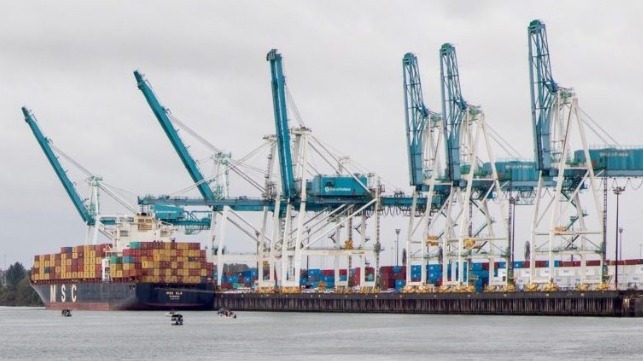With New MSC Service, Port of Portland's Fortunes Are Looking Up

The Port of Portland's long-idled container terminal is starting to see new signs of a comeback, five years after it lost its last container service.
Portland's port is located on the Columbia River, about 100 river miles inland from the Pacific Ocean. It maintains a busy ro/ro terminal and it is an important hub for bulk grain exports, but its container terminal has been little-used in recent years. In addition to the challenges of the Columbia River Bar and the long stretch of pilotage upriver, the navigation channel is maintained at 43 feet of depth - not deep enough for the latest generation of boxships to call with a full load.
These challenges put Portland at a disadvantage relative to its competitors in Seattle and Oakland, and a protracted labor dispute over reefer plugs put the final nail in the coffin for every one of its service rotations. The now-defunct Hanjin Shipping was the last major brand to depart in 2015, and small specialty line Westwood departed in 2016, leaving the port without any regular container services.
Four years later, in January 2020, South Korean national carrier SM Line relaunched a weekly service to Portland, bringing new activity to the long-idled Terminal 6. This month, the Port of Portland announced that SM Line would be adding two more vessels per month to the rotation. In addition, the port said that number-two container carrier MSC has agreed to bring a weekly service to Portland.
This weekend, the first MSC container ship to call Portland's T6 arrived at last. The traditional-Panamax MSC Ela, with a capacity of 4,900 TEU, berthed on Sunday with assistance from Foss Maritime tugs.

that matters most
Get the latest maritime news delivered to your inbox daily.
"MSC calling on the Port of Portland is a huge boost for the region, and illustrates the strength of the maritime infrastructure along the Columbia River," said Art Dahlin, general manager for the Columbia at Foss. "As a solution to the many challenges facing the supply chain due to the pandemic, MSC’s arrival supports the fact that the Port of Portland is a viable option for shipping companies calling on U.S. West Coast ports."
MSC's decision to add a Portland service comes amidst historic congestion at all of the West Coast's major hubs. The ports of Los Angeles and Long Beach are regularly setting new records for the number of waiting boxships and number of boxes handled. To break through the backlog, container lines have diverted more cargo to Oakland and Seattle, and smaller regional ports are eyeing new opportunities to pick up volume. The remote Southern Oregon port of Coos Bay is planning to build a major container terminal right on the coast, leveraging its dedicated rail line to shuttle boxes inland by intermodal service.
